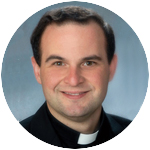
Father Eric J. Banecker
During my freshman year of college, I walked into a small philosophy seminar class in late winter. As I started placing my books on the desk, one of my classmates said to me, “hey are you rushing a frat?” I remember saying something like, “Umm, no. Why do you ask?”
His response was, “well you’ve got some dirt on your forehead. I thought it was a hazing thing.” “Oh, it’s Ash Wednesday,” I said out loud. The professor, slightly amused by the exchange, quickly initiated our discussion on Immanuel Kant.
Having grown up in South Philadelphia and being a product of Catholic schools, it never dawned on me that there was anyone alive who wasn’t at least aware of Ash Wednesday. But then again, there are many traditions of other religions that I have no idea about.
[hotblock]
The point is this: the gesture of receiving ashes on our foreheads each year is by nature a public statement, the kind of thing people notice. It is a statement of faith, of repentance, of belonging to the Church, even for those who don’t regularly attend Sunday Mass. The ashes are on our foreheads: we cannot really see them, but others can. And that’s precisely the point.
Many of us treat Lent as a second shot at our New Year’s resolutions. But our outward-facing ashes are a clue that this is probably not quite right. Lent isn’t really about me at all. It is about what God is accomplishing in us, how he wants to renew us in our baptismal identity, how he wants to bring the elect into friendship with him through the Easter sacraments.
Our retired Holy Father, Pope Benedict, spoke often of the Copernican Revolution. Nikolaus Copernicus was the astronomer (and devout Catholic) who proved mathematically that the earth revolved around the sun, and not vice-versa. This caused a revolution in the way scientists looked at the universe and in the way philosophers saw our place in it.
Benedict often called for a new Copernican Revolution, one in which I cease to be the star of my own drama, and instead see myself as part of God’s plan, within God’s orbit. I stop focusing on my own concerns, and instead turn my attention to following God’s will and helping our brothers and sisters in need.
And there are certainly many people in need in our universe. We live in an age of fear and anxiety. Mental health issues abound, among young people increasingly so. The phenomenon that Pope Francis calls the “globalization of indifference” continues to poison our culture. It leads many to ignore the unborn, the homeless, the addicted, migrants, and the environment.
[tower]
So many people are lonely or isolated from family and communal life. Many fixate on political activism, which only leads to disappointment, instead of seeking first the Kingdom of God through worship, prayer, and charity.
In the midst of all this, it would seem that six weeks of prayer, fasting, and almsgiving is the last thing we need. After all, we might ask, what can such practices do in the face of so much suffering? Yet often we fail to realize the spiritual power of such activity.
When we fast, we acknowledge our dependence on God. We remind ourselves that what sustains our life in the end is not food or drink or money or fame, but a good and loving Father who provides all that we need. “Man does not live by bread alone,” Jesus reminds us in the Gospel every Lent, “but by every word which comes from the mouth of God.”
As we wean ourselves off our reliance of food and drink, we become better open to receive God’s love, whether at Mass, in personal prayer and study of Scripture, through eucharistic adoration, or in the celebration of the sacrament of penance. In short, fasting results in prayer that is more fruitful for ourselves and others.
Prayer, oratio, should then always lead us to works of charity, actio. We have to trust that the Lord will give us more time and energy to do good — not less! — if we persevere in fasting and prayer. In short, when we see these three activities as connected, the Lord accomplishes amazing things through us.
So no, we are not rushing a frat. Instead, we — the whole church — are setting out once again on what the liturgy for Ash Wednesday calls “this campaign of Christian service.”
Though what each of us does during Lent might seem so small in relation to this world’s many needs, everyone doing it together can indeed transform the world. Jesus Christ accomplished that definitive Copernican Revolution, such that we who believe in him, “might live no longer for ourselves, but for him who died and rose again for us.”
May we embrace that call anew this Lent – and inspire others to do the same.
***
Father Eric J. Banecker is parochial vicar at St. Pius X Parish, Broomall.
PREVIOUS: Archbishop’s installation reminds us to unleash God’s love
NEXT: Like musicians, we keep our gaze on the Conductor



Share this story